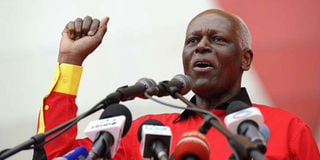Dos Santos to retire from politics in 2018

Angolan President Jose Eduardo dos Santos delivering a speech during his final election campaign rally in Kilamba Kaixi, on the outskirts of Luanda. Angola's long-ruling president plans to step down in 2018. PHOTO | AFP
What you need to know:
- The 73-year-old has been in office just one month less than Africa’s record-holder, Equatorial Guinea’s Teodoro Obiang Mbasogo Nguema.
- The Angolan leader’s tenure ends in late 2017 but he did not indicate why he would leave the year after.
- Critics accuse President dos Santos of overseeing corruption, misrule, arbitrary arrests and intimidation.
LUANDA, Friday
Angola’s powerful veteran President Jose Eduardo dos Santos, Africa’s second-longest-serving leader after 36 years at the helm, has said he would leave politics in 2018, when his current mandate ends.
“I have taken the decision to quit political life in 2018,” he told the ruling Popular Movement for the Liberation of Angola (MPLA) party politburo in the capital Luanda on Friday.
The 73-year-old has been in office just one month less than Africa’s record-holder, Equatorial Guinea’s Teodoro Obiang Mbasogo Nguema.
President Nguema came to power after overthrowing his despotic cousin Marcias Nguema.
The Angolan leader’s tenure ends in late 2017 but he did not indicate why he would leave the year after.
Political analysts suggest he may run for re-election, leaving only once he feels secure about the future.
In power for almost four decades as head of state, President dos Santos has consolidated political power in his time in office while his family has amassed a vast business empire. He has maintained close links with former colonial power Portugal.
President dos Santos, who added another five years to his reign by taking a huge victory in a disputed election in 2012, has faced growing discontent from the nation’s young people since.
OVERSEEING CORRUPTION
Critics accuse President dos Santos of overseeing corruption, misrule, arbitrary arrests and intimidation.
Ms Paula Roque, an expert researcher on Angola with Oxford University, believes the unexpected announcement offers no assurance that one of Africa longest-serving heads of state would finally step down.
“What he is saying by announcing that he will step down in 2018 is that he will run in the next poll and then decide if the country is stable enough for him to leave,” Ms Roque said.
President dos Santos ascended to power in 1979 following the unexpected death from cancer of Angola’s liberation president and founding father Agostinho Neto.
As head of the military, police, ruling party and Cabinet, the leader has an iron grip on all aspects of power in Africa’s second-biggest oil producer after Nigeria.
He names senior judges and has MPLA allies in all public agencies, including the supposedly independent national electoral commission.
Ms Roque believes President dos Santos could be grooming one of his children to succeed him.
Few Angolans publicly criticise him. Independent journalists and analysts who express their opinions risk criminal charges and long jail terms.
A group of youth activists are currently standing trial on charges of “rebellion” and attempting to carry out a coup.
Although he shuns the spotlight, the elderly leader’s family has built up a vast business empire with his daughter Isabel dos Santos ranked Africa’s richest woman.
Despite the country’s oil and diamond riches, the majority of the population lives in abject poverty with a staggering gap between the wealthy and the poor.
Angola in 2002 emerged from a 27-year civil war which left thousands of people dead and the country has held few elections since independence from Portugal in 1975. The war ended shortly after veteran rebel leader Jonas Savimbi was killed in clashes with government troops.





